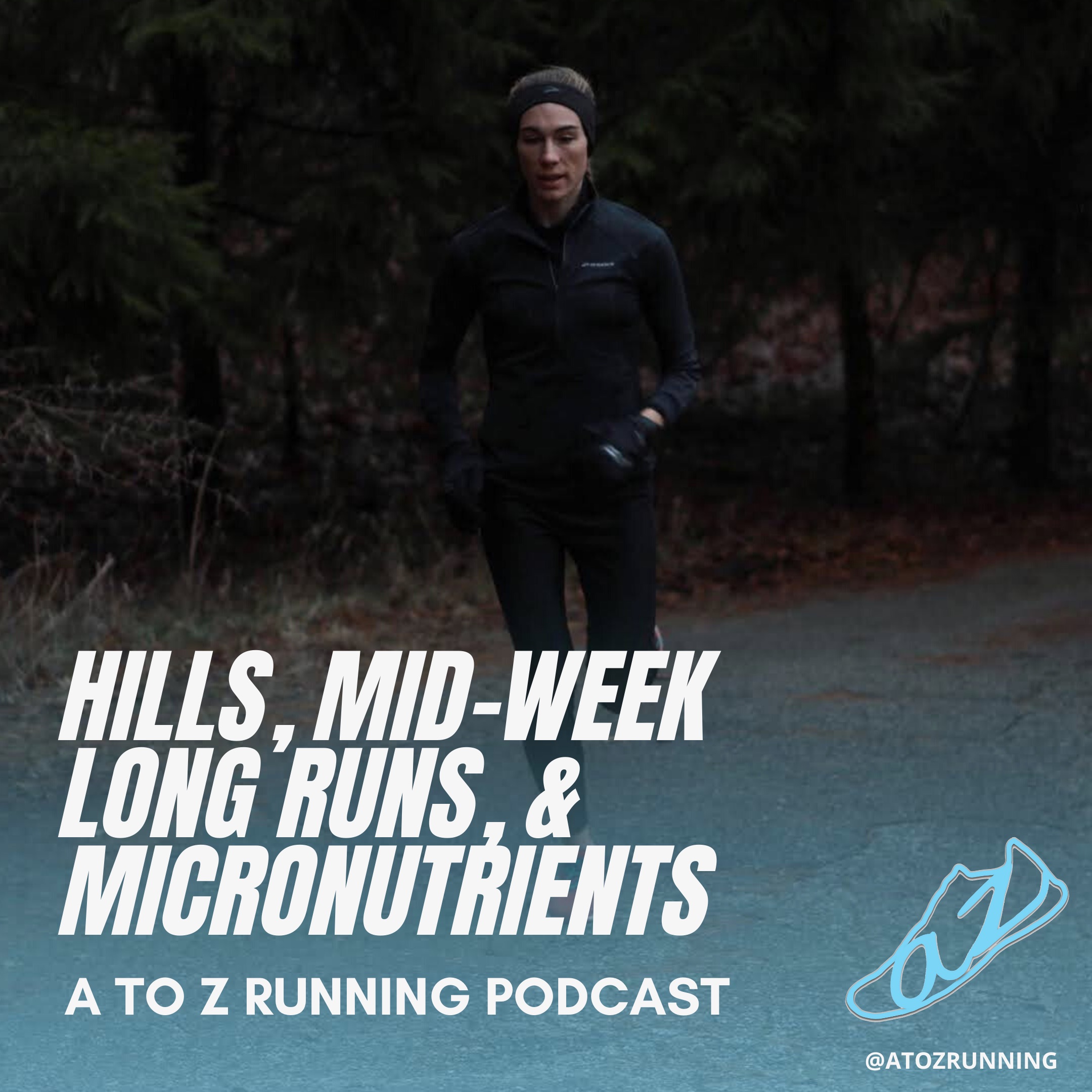LISTEN
In this episode of the A to Z Running podcast Zach and Andi and listener Q & A about how to approach hill workouts, the importance of mid-week longer runs, vitamin and mineral balances, and more.
Keep listening for more world records in the world of running segment!
INTRO
-
-
- FOLLOW and SUBSCRIBE
- Thanks for joining in on the conversation on social media.
-
MAIN TOPIC: Hills, mid-week long runs, and micronutrients.
Question: Am I missing something by not running a mid-week long run?
Lê Wirth
Hi Andi and Zach! I love your podcast, just listening to the one about leg strength… How important or essential is that mid week medium long run in marathon training? I’m training for my second marathon, I’ve been running consistently 6 times a week, plus my master swim practices. Friday is my rest day (from running) and Saturday my long run. I have unlimited time on the weekend, but during the week it’s very hard for me to run longer than 70 minutes, or around 14km. Am I wrong or missing too much more if I don’t run over about 14km during the week?
Our Thoughts:
- This is a struggle for many busy runners, however, when a runner can fit in a long run during the week.
- You should be doing as much long easy running as you can.
- The degree of adaptations are higher.
- Capillary density.
- Respiratory.
Question: Why are your long runs so long when the race is still two months away?
From Bill, Michigan
- This was a conversation between Bill and one of our athletes. Our athlete is running the Boston Marathon and has been doing 3 hour long runs for the last couple weeks.
- Bill is also running the Boston Marathon but is taking a different approach:
Why are your long runs so long when the race is still two months away? How many more runs of this distance will you do? I will basically be adding a mile to my long run until a few weeks before when I’ll be running about 22.
Our Thoughts:
- You do not want to run your longest run only weeks before the marathon. This is very risky.
Question: What vitamins and minerals should I be monitoring?
From Karl, Jenison, MI
What vitamins and minerals, and D and magnesium, calcium, iron, etc should I be monitoring?
I know everyone is different and there is not one catch all supplement but…..
I have my physical next month and I was going to ask my DR to test my levels. What specifically would you suggest I ask about that is related to and a problem for runners?
Our Thoughts:
- In general, good to test for mineral levels (iron, zinc, calcium, magnesium, potassium). I’m not sure exactly which ones they really pay much attention to in this kind of test – calcium lives mostly in the bones, so I don’t know what that looks like in a blood test.
- Certainly iron and zinc, though, as they are both involved in oxygen and blood interactions. Mags/Pots are testable, but those are easy things to influence (you can change their levels in minutes by taking things like supps as well as just eating something that is high in them – this is why things like bananas when you have a cramp help quite quickly) – so I would not worry much about those in a test necessarily, but if they can show it, good to see!
- Iron and zinc take longer to influence levels, so those are important ones to notice. In both instances, low levels as well as too high levels produce mostly the same symptoms (fatigue and such being most common), so good to test their levels because you don’t want to be slamming supps on those if the levels are actually high (though that is very uncommon for most of us…).
- Vitamins… D and C for sure as those are the ones that interact with the most other processes (both for their own sake and things like helping minerals absorb). Also B vitamins (I think there are specific ones more important than others… like B12, but I am not up on which exactly should be tested… might be they only test for certain ones?)
- Other considerations: good to test for sugars/fats(lipids) balance – this is a sneaky thing because the nature of your training plays huge into what’s going on (during large volume periods of lower intensity, your body is going to need more fat and might upset the levels a bit, but if you hit a 5k time trial hard or do a couple hill intervals in a week, suddenly the sugar side jumps…). So that kind of test is not quite as helpful for more than immediate considerations (in some ways, it might be helpful for runners to test sugar/fat balance on a weekly basis if not more… which is obviously excessive, but for the info to be helpful it really needs to be that frequent).
Question: Should I consider starting to build some hills in?
From Brandon, Hudsonville, MI
Should I consider starting to build some hills in? Perhaps as a part of my fartlek?
Context: Training for Boston Marathon, nearing the end of conditioning phase, Boston is a course with notable hills. Does have history of achilles concern but is not currently experiencing issues.
Our Thoughts:
- What is terrain like where you normally run? (Flat? Hilly?)
- Best timing for hill-focused training is after conditioning up to 3 or so weeks before the goal race
- In this situation, conditioning done, time still before 3 weeks before race, so definitely include some hill work.
- ADDITION FROM CHADD: how much time do you need for hills to be beneficial? (Asking in terms of how many workouts necessary to reap the benefits)
- 2-4 weeks to experience substantial adaptations
- Good have a couple instances in a week
Question: Should I drink coffee the morning of my race?
From Taylor, Austin, TX
Should I drink coffee the morning before my first marathon?
Taylor is a regular coffee drinker.
- If you’ve been doing it before your runs, specifically your long runs, the answer is a strong YES.
- If you are new to coffee and are only interested in the caffeine benefits, skip the coffee and intake in a way you have before- like a gel with caffeine, Run Gum, etc.
- Research shows that using caffeine can be beneficial to our overall readiness. The study is called, “The acute effect of a caffeine-containing energy drink on mood state, readiness to invest effort, and resistance exercise to failure.” “These results suggest that acute ingestion of a caffeine-containing energy drink can enhance resistance exercise performance to failure and positively enhance psychophysiological factors related to exertion in trained men.”
- The science is not clear how, but one major benefit of caffeine is that it enhances your body’s use of fat as a fuel source, thereby conserving glycogen. This is very helpful during a long distance race!
- A RunnersConnect article answered the nagging question many runners have, “Does caffeine make you dehydrated?” Caffeine is a diuretic, however exercise counteracts its negative impact on hydration.
- In a recent scientific review, researchers from the University of Connecticut found that, contrary to popular beliefs, caffeine consumption does not result in:
- water-electrolyte imbalances
- hyperthermia
- reduced exercise-heat tolerance.
- Here’s the deal:
- A runner can safely have up to 550 milligrams of caffeine (or about five cups of coffee) without affecting hydration levels.
WORLD OF RUNNING
#1. USATF Indoor Championships
Impressive doubles…
- Womens 1500m
- Heather MacLean snatched the women’s 1500m in a blazing final kick to overcome Josette Norris and Elle Purrier St. Pierre.
- All three women were within a tenth of a second from one another in a photo finish.
- Purrier St. Pierre led the entire race until she was outkicked.
- Women’s 3,000m
- After Purrier St. Pierre’s disappointment, narrowly missing the US team, she upset Alicia Monson and Weini Kelati by running away with the 3000m win.
- Mens 3000
- Late in the race Cole Hocker unleashed his impressive kick and took the field by storm
- Letsrun described how it looked, “a man among boys”
- Men’s 1500m
- Hocker doubled up a day later to once again kick away from the field (though a fair bit more narrowly)
Epic legacy…
- Women’s 800m
- Ajee Wilson claimed her 8th indoor USA 800m title.
And a little controversy…
- Men’s 400m
- Donovan Brazier was DQed in the prelims but was second in the finals to make the USA team for worlds (more on that here)
#2. Women’s world record on the roads
(From World Athletics)
- On Sunday, 2/27 at the Castellón 10K in Spain
- Ethiopia’s Yalemzerf Yehualaw (NN Running Team) broke the 10k world record in a time of 29:14 (only 13 seconds off the 10,000m record on the track)
- 24 seconds off the previous best (a record from 2021 that had yet to be ratified)
- Came through the 5k in 14:28 (28:56 pace) but couldn’t hold
- According to World Athletics, “Yehualaw had intended to break the world record at the 10K Valencia at the start of January, but a positive Covid test ruled her out of the event.”
- Notably, Yehualaw nearly broke the half marathon world record twice in the last year (once, she ran the time but the course was short, the other time, she ran the time, but Letesenbet Gidey ran a minute faster in the same race)
- And with all this, when asked about future plans, she noted, “I won’t focus on the track season because I probably wouldn’t challenge for a place on Ethiopia’s 10,000m team for the World Championships. Instead, I plan to tackle the marathon later in the year and the World Half Marathon Championships in November.”
#3. Masters 5000m Championship
- Headlining news at the event was 98 year old Betty Lindberg who set the 95+ age group record of 55:47. Betty crushed the previous record of 1:28:36.
- Betty started running at the age of 63.
- Interested in a training plan and/or coaching? We offer personalized support to help you achieve your goals!KEEP LISTENING




Leave a Reply
Want to join the discussion?Feel free to contribute!